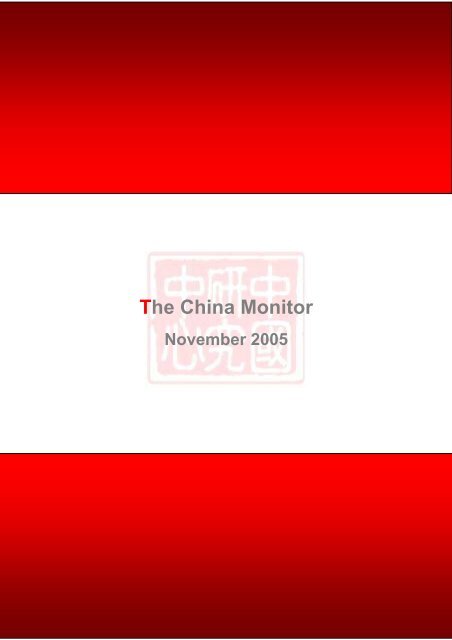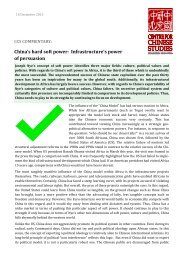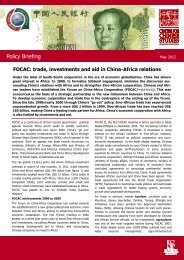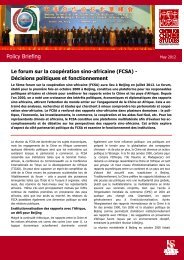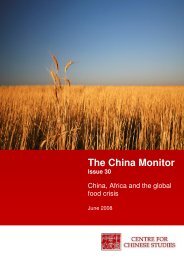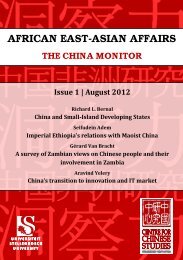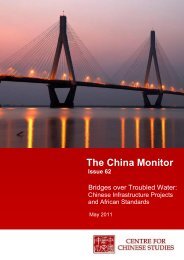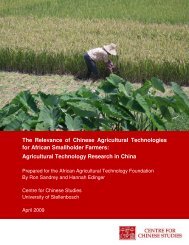The China Monitor - The Centre for Chinese Studies
The China Monitor - The Centre for Chinese Studies
The China Monitor - The Centre for Chinese Studies
Create successful ePaper yourself
Turn your PDF publications into a flip-book with our unique Google optimized e-Paper software.
<strong>The</strong> <strong>China</strong> <strong>Monitor</strong><strong>The</strong> <strong>China</strong> <strong>Monitor</strong>November 20051
<strong>The</strong> <strong>China</strong> <strong>Monitor</strong>ContentsPageEditorial 3Dr. Martyn J. Davies, <strong>Centre</strong> <strong>for</strong> <strong>Chinese</strong> <strong>Studies</strong>Letter from <strong>China</strong> 4Beijing: <strong>China</strong> at a GlanceLucy Corkin, Marulelo CommunicationsMarket Watch 7<strong>China</strong>’s Banking ChallengeDr. Martyn J. Davies, <strong>Centre</strong> <strong>for</strong> <strong>Chinese</strong> <strong>Studies</strong>Business Briefs 10A round-up of <strong>China</strong> news from the past month<strong>China</strong> & Africa 16News briefs highlighting <strong>Chinese</strong> relations with Africa<strong>The</strong> <strong>China</strong> Forum 19Recent and upcoming eventsContact Us 23A Publication of:<strong>The</strong> <strong>Centre</strong> <strong>for</strong> <strong>Chinese</strong> <strong>Studies</strong>Faculty of Arts, University of Stellenbosch2
<strong>The</strong> <strong>China</strong> <strong>Monitor</strong>EditorialDuring the past month an array of <strong>China</strong>-focused events have taken place across South Africa. <strong>The</strong><strong>Centre</strong> <strong>for</strong> <strong>Chinese</strong> <strong>Studies</strong> participated in a number of these including co-hosting with the WesternCape Provincial Government’s Trade and Investment Promotion Agency (WESGRO) a BusinessSeminar focusing on <strong>China</strong>.<strong>The</strong> reaction from the local manufacturing sector toward <strong>China</strong> is often not positive. South Africanemployers and organized labour fear hollowing out in the face of price competition from <strong>China</strong>. Whilstrecognizing the extent of <strong>China</strong>’s manufacturing competitiveness, the business seminar served tohighlight the market entry strategies employed by businesses that aresuccessfully accessing the <strong>Chinese</strong> market. <strong>The</strong>se companies includedUnilever, Namakwa Sands, the Citrus Growers Association and MCMWines.<strong>China</strong>’s increasing engagement with Africa was the theme at aJohannesburg event. <strong>The</strong> <strong>Centre</strong> contributed to a joint conference heldby the Institute <strong>for</strong> Global Dialogue, South African Institute ofInternational Affairs and the Friedrich Ebert Stiftung entitled “<strong>China</strong> inAfrica: Mercantilist Predator or Partner in Development?” <strong>The</strong> eventbrought together academics from Benin, Sudan, Tanzania, UK, US andZambia. <strong>The</strong> divergence of academic views on <strong>China</strong>-Africa relationswas at times stark. It is this subject that the <strong>Centre</strong> <strong>for</strong> <strong>Chinese</strong> <strong>Studies</strong> has as its mission.Stellenbosch University and the <strong>Centre</strong> will be sending a delegation to <strong>China</strong> later this monthaccompanying the South African Minister of Education, H.E. Naledi Pandor. Stellenbosch will besigning exchange agreements with Beijing University and Tsinghua University, <strong>China</strong>’s <strong>for</strong>emostinstitutions of higher learning. We are confident that these ties will further deepen educational cooperationbetween our two countries and respective institutions.Dr Martyn J. DaviesDirector, <strong>Centre</strong> <strong>for</strong> <strong>Chinese</strong> <strong>Studies</strong>3
<strong>The</strong> <strong>China</strong> <strong>Monitor</strong>Letter from <strong>China</strong>Beijing: <strong>China</strong> at a GlanceBy Lucy CorkinHaving recently returned from a three-week Mandarin course atBeijing Capital Normal University in June this year, I was af<strong>for</strong>dedan insider’s glimpse of the waking giant. Staying in the capitalcity, the seat of political power in what is still very much acentralised economy, it seems that what I experienced as anoutsider on a micro-level is being manifested in national trends.<strong>China</strong> is vast; a world in itself. Although approximately 93% of the <strong>Chinese</strong> population are part of theHan nation, <strong>China</strong> is home to 56 minority groups. Furthermore, the idea of a common tongue is, at“<strong>The</strong> idea of acommontongue is, atpresent, nonexistent”present, non-existent. Mandarin <strong>Chinese</strong> owes its status as the officiallanguage of <strong>China</strong> to the fact that it is merely the dialect spoken by those inBeijing. It is still the case that <strong>Chinese</strong> dialects are numerous and diverse,especially in the more rural areas. Mandarin <strong>Chinese</strong>, following <strong>China</strong>’sopening up to the West, has now become the business lingua franca,especially in preparation <strong>for</strong> the Beijing 2008 Olympics. It is the official school language medium inorder to standardise communication.Of the Western nations that have realised the politico-economic expediency of learning Mandarin, theUnited States and, interestingly, France, seemed to be in the majority. According to Professor Liu ofBeijing Capital Normal University’s Foreign Students’ Mandarin Programme, who had been teachingMandarin to <strong>for</strong>eign students <strong>for</strong> 15 years, Western students grasp the pronunciation (although notnecessarily the tones) of the spoken language fairly easily incomparison to their Eastern counterparts. Westerners displayineptitude in the writing of characters, an aspect of the languagethat Korean and Japanese students excel in, since much of theirown languages’ modern written <strong>for</strong>m is derived from <strong>Chinese</strong>traditional script.An in<strong>for</strong>mal survey conducted among Beijing taxi drivers confirmed that the number of <strong>for</strong>eigners thatpour into Beijing annually has increased exponentially over the years,and a yangguize (<strong>for</strong>eign devil) will not draw too much attention in thecapital city anymore. While the most entrepreneurial of peddlers andsalespeople will have a smattering of English, or at least a few setphrases learnt by rote, English is still not widely spoken. Academics anduniversity graduates will competently read English field-specific journals“A yangguize(<strong>for</strong>eign devil) willnot draw toomuch attention inthe capital cityanymore”4
<strong>The</strong> <strong>China</strong> <strong>Monitor</strong>and articles, but their oral ability is remarkably poor. With time, however, this is set to change. <strong>The</strong>government is on a huge educational drive, especially where language is concerned, and pre-schoolchildren are learning their first English words barely be<strong>for</strong>e they can recognise characters in their ownlanguage.<strong>The</strong> government is not the only <strong>for</strong>ce behind intensivelearning however. <strong>The</strong> infamous one-child policy of the<strong>Chinese</strong> government, started in the 1970s to curb theburgeoning population, has given rise to what is known as“Little Emperor Syndrome”. In keeping with the traditionalimportance of family, the youngest generation ischerished. With a growing middle-class of dual-incomehouseholds and increasing disposable income, moremoney and attention from both parents is concentrated on the single child. Thus <strong>Chinese</strong> children are,from an extremely young age, encouraged to engage in a host of extra-mural activities, ranging frompainting and dancing classes to extra English tuition.Consumer trends are increasingly affected by modernisation. In Beijing at least, supermarket chains“Supermarket chainsand shopping mallshave become vastlymore popular thanthe traditional<strong>Chinese</strong> market”and shopping malls have become vastly more popular than thetraditional <strong>Chinese</strong> market, <strong>for</strong> those who can af<strong>for</strong>d it. Within thesecommercial centres, which seem to be mushrooming all overurbanised areas, quality is guaranteed and the price is fixed,especially if the store is state-owned. Being able to shop at chainstores such as French-owned Carrefour ensures that shoppers pay<strong>for</strong> quality; something that cannot be guaranteed at the street market, even <strong>for</strong> the more savvy locals.On the street the price of market goods, whatever their nature, is negotiable. Vendors assess thepotential buyer in terms of whether he or she is a <strong>for</strong>eigner, an out-of-towner, or a local, and marks theprice up accordingly. It is taken <strong>for</strong> granted that one will bargain.Interestingly, Beijing’s cost of living on the whole is reportedlycheaper than other city centres such as Shanghai andGuanzhou, perhaps because goods don’t have such hightransportation costs, or through other interventions such asgovernment subsidies.Political commentary in <strong>China</strong> is no longer uni<strong>for</strong>m, nor blindly approving of the government. It isrecognized that the Party has achieved much progress in the few short decades since Deng XiaoPeng’s “Open Door Policy” of 1978. Public works are rapidly erected at a speed that would put thebureaucracy of most other nations to shame. <strong>The</strong> Olympics are to be held in less than three years andthe infrastructure the <strong>Chinese</strong> require to host such an event is not nearly completed. A professor at theBeijing Capital Normal University remarked that this is not problematic, as the government would5
<strong>The</strong> <strong>China</strong> <strong>Monitor</strong>definitely meet its deadlines. Aside from the vast work<strong>for</strong>ce at its disposal, the government canunilaterally sweep away all the bureaucratic red-tape that usually hampers such projects. Considering<strong>China</strong>’s undisputed growth rate, this makes <strong>for</strong> an interesting lacuna in the theory that democraticcountries rank highest globally in economic prosperity.Anecdotally, freedom of speech and its expected practice orlack thereof held some surprises. I noted with interest that theacademics I interacted with freely expressed criticism of localgovernment administration where they felt it was due. Incontrast however, it seems that media, especially <strong>for</strong>eignmedia based in <strong>China</strong>, are strictly state-censored.National heroes, such as Chairman Mao, are still very much revered as partof the heritage of which the <strong>Chinese</strong> are fiercely proud. Street vendors areprolific with Mao souvenirs, but one gets the distinct impression that they wereeager to display these Mao trinkets because they seem popular with“Capitalism, itseems, hasindeedarrived.”Westerners, rather than due to nationalistic fervour. Capitalism, it seems, has indeed arrived.In its essence, Beijing seems to be a city in trans<strong>for</strong>mation. What is undoubtedly the most strikingaspect of the city is that the old is juxtaposed with the new. With a reported 800 000 new internetusers a week and over 368 million cell phone users, <strong>China</strong> is undisputedly one of the fastest growingcountries in the world. But its 5000 year old culture, having survived the 20 th century, is not to bedismissed by the 21 st .With a nod at Wallerstein, it seems that <strong>China</strong> has learnt from historical precedent. In the sixteenthcentury, <strong>China</strong>, the most advanced country in the known world, was poised to become a global power.<strong>The</strong> Middle Kingdom instead chose to maintain its isolation and walled the ‘barbarians’ out, eventuallyfalling into decline. Now, five hundred years later, with one of the highest rates of Foreign DirectInvestment in the world, <strong>China</strong> is welcoming the global influx withopen arms and an opening economy, ready to learn othertechnologies. In addition, a recent study conducted by the WorldBank and the International Finance Corporation ranked <strong>China</strong> (withHong Kong) at seventh place in terms of ease of doing business.<strong>China</strong> is stronger <strong>for</strong> it.<strong>The</strong> inevitable conclusion is that Beijing, one of the hubs of this dynamic developing country, is acomplex environment with many contradictory <strong>for</strong>ces. A few shorts weeks served only to offer aglimpse of the bustle and energy at <strong>China</strong>’s core as the old learns to embrace the new.6
<strong>The</strong> <strong>China</strong> <strong>Monitor</strong>Lucy Corkin is a communications consultant with a Masters' degree in International Politics fromStellenbosch University. She recently attended a short-term Mandarin course <strong>for</strong> <strong>for</strong>eign students atBeijing Capital Normal University.Market Watch<strong>China</strong>’s Banking ChallengeBy Dr Martyn J. Davies<strong>China</strong>’s economic growth continues unabated. It is an important source ofglobal growth and <strong>for</strong>eign economies are rapidly becoming reliant on itsexpanding market. Undoubtedly this offers great opportunity <strong>for</strong> multinationals operating in <strong>China</strong>. Butin the event of an economic slump, it also heightens the risk of contagion as <strong>China</strong> becomes part ofthe global market economy.<strong>The</strong> greatest re<strong>for</strong>m challenge faced by <strong>China</strong> is that of its moribund banking sector. Financialmanagement will determine the growth scenario of <strong>China</strong> in the decades to come.Managing financial re<strong>for</strong>m<strong>The</strong> <strong>Chinese</strong> Government’s greatest management challenge in itseconomy is the domestic banking sector. <strong>The</strong> challenge is totrans<strong>for</strong>m a moribund state-owned sector into an efficient capitalallocating and competitive financial services sector. A major movetoward this is the pending listing of the Bank of <strong>China</strong> (BOC) and theIndustrial Commercial Bank of <strong>China</strong> (ICBC) on the internationalmarket.“<strong>The</strong> <strong>Chinese</strong>Government’sgreatest managementchallenge in itseconomy is thedomestic bankingsector”Going to the international market will have a range of dramatic impacts upon <strong>China</strong>’s banking sector.Its access to international markets will improve the capital competitiveness of its multinationals;<strong>for</strong>eigners will gain footholds and lend strategic direction to <strong>China</strong>’s domestic financial servicesdevelopment; risk management in lending will become more prevalent; and the implementation – orimposition <strong>for</strong> that matter – of measures promoting corporate governance by <strong>for</strong>eign interests will havethe greatest impact of all.<strong>The</strong> move of <strong>China</strong>’s largest lenders to the stock market willhave profound implications <strong>for</strong> lending in the domesticeconomy as well as to <strong>Chinese</strong> firms in the internationalmarket, including Africa. <strong>The</strong> changing rules of <strong>China</strong>’scapital market will impact on the state’s <strong>for</strong>eign commercialstrategies. <strong>Chinese</strong> firms will no longer be able to “cheat on7
<strong>The</strong> <strong>China</strong> <strong>Monitor</strong>capital” as they are often accused of doing. Thus with marketisation, <strong>Chinese</strong> firms will lose their“capital competitiveness”.For <strong>China</strong>’s listed banks, a capital “behavioural change” will develop. Lending based on the calculationof risk rather than the traditional relationship-based model will emerge. This will, however, take anumber of years be<strong>for</strong>e becoming apparent. For the first time in modern <strong>China</strong>, an apolitical creditculture will emerge. <strong>Chinese</strong> banks will start to act like banks rather than mere vehicles to distributestate-directed capital.RMB value as a competitive driver<strong>The</strong>re is now an international obsession over the value of <strong>China</strong>’scurrency, the RMB. However, its revaluation poses no risk to theinternational financial system. <strong>The</strong>re was no impact on globalfinancial markets following its July revaluation. <strong>The</strong> recent attentionand media speculation that followed with the RMB revaluation wasunfounded.“Westerngovernmentslobbying <strong>China</strong> <strong>for</strong>a free float currencywill continue to bedisappointed.”Due to the new (narrow) trading band of the RMB of just 0.3%, theperception - and possibly even the practical reality - is that <strong>China</strong> hasmerely re-pegged the RMB. With such little volatility, the market hasalmost zero influence on RMB value. Despite Beijing’s claims of aliberalised monetary policy, the actual reality is somewhat different andremains more State than market-influenced. Western governmentslobbying <strong>China</strong> <strong>for</strong> a free float currency will continue to be disappointed.Last year the PBOC spent US$210 billion to contain the upward pressure on the RMB. This year thePBOC will spend between US$150-200 billion doing the same. So much <strong>for</strong> <strong>Chinese</strong> monetary policyre<strong>for</strong>m!But the recognised trend over the long term is that the currency will move upwards, <strong>for</strong>cingcompetitiveness upon <strong>Chinese</strong> firms. It is <strong>for</strong>ecast that in the event of a 10% appreciation in the valueof the RMB, the growth in exports of textiles and garment will decline by 8-9%.A strengthening currency environment will undoubtedly facilitate the process of <strong>Chinese</strong> firmsbecoming multinationals. <strong>The</strong>ir increased exposure to the market, their ability to compete on processrather than rely upon a cheap currency and their ability to acquire international assets at a lower priceall drive this trend. But different industries will internationalise at different paces.8
<strong>The</strong> <strong>China</strong> <strong>Monitor</strong>Aspirant multinationals<strong>Chinese</strong> firms are rapidly seeking to move toward multinational status. <strong>The</strong> establishment of <strong>China</strong>’smultinationals is often compared to that of Japan and Korea. But at comparative stages ofdevelopment, <strong>China</strong>’s economy is far more open to <strong>for</strong>eign involvement than its neighbours.Considering this, <strong>Chinese</strong> firms are rapidly integrating into the global supply chain. <strong>Chinese</strong> brand<strong>for</strong>mation may, however, lag that of its Asian competitors.<strong>Chinese</strong> players seek to fast track their international market entry through the purchase of established<strong>for</strong>eign brands. Recent examples include Lenovo’s acquisition of IBM’s PC business and Haier’sattempted purchase of white goods company Maytag in the US. But <strong>Chinese</strong> brands are battling togain traction in the international market, a task made more difficult by the negative publicity <strong>Chinese</strong>exports are receiving from protectionist manufacturing lobbies.A <strong>Chinese</strong> Enron?<strong>The</strong> motivation of <strong>Chinese</strong> partners in Sino-<strong>for</strong>eign joint ventures is most often to obtain managementprocess, not capital. When speaking with the top management of <strong>Chinese</strong> banks, it is apparent thatthey do not lack money but rather seek management best practice.But corporate governance is very difficult to institute in <strong>Chinese</strong> state-owned enterprises, no matterwhat the size of <strong>for</strong>eign equity stake. Ownership structuredetermines the corporate governance practice in <strong>China</strong>.Typically, in state-owned or state-invested enterprises,relationships determine outcomes rather than managementprocesses. Poor standards of corporate governance in <strong>Chinese</strong>state owned companies compounds investing in the country’sstock markets.<strong>China</strong>’s Shanghai and Shenzhen stock markets continue to per<strong>for</strong>m poorly. <strong>The</strong> paradox of <strong>China</strong>’s“Until corporategovernanceimproves, <strong>China</strong>’sstock markets willserve littlepurpose”development is that stock markets as vehicles <strong>for</strong> raising andallocating private capital cannot function in an environment wherein<strong>for</strong>mation is not free flowing. <strong>The</strong> State’s monopoly on in<strong>for</strong>mationprevents efficient capital allocation in <strong>China</strong>. Until corporategovernance improves, <strong>China</strong>’s stock markets will serve little purpose.Sustainable growth or market correction?<strong>China</strong>’s government has embarked upon an irreversible program of economic re<strong>for</strong>m. But no singledeveloping economy has ever enjoyed a smooth transition to the market. Without commensuratereturns in productivity, <strong>China</strong>’s growth will not be sustainable.9
<strong>The</strong> <strong>China</strong> <strong>Monitor</strong>Will the Government be able to manage this re<strong>for</strong>m to its market conclusion? This remains to be seen.As the system “marketises”, the Government will increasingly have less centralised control and policylevers available to manipulate the domestic financial system. Investors both domestic and <strong>for</strong>eign arebecoming “drunk on growth” in <strong>China</strong>. This abrogates risk. Similar factors present in Southeast Asia inthe mid 1990s are emerging in <strong>China</strong> today.A market correction is undoubtedly coming. <strong>China</strong>’s government, undoubtedly powerful, is not biggerthan the market. <strong>The</strong> trigger of a market correction will be the failure of a significant domesticcommercial bank or alternatively an international energy price shock that the Government will nolonger be able to af<strong>for</strong>d to subsidise.Whether <strong>China</strong> can emulate Korea’s emergence from crisis or flounder like Japan after the bursting ofits bubble economy in 1989 is the key scenario question.Dr Martyn J. Davies is Director of the <strong>Centre</strong> <strong>for</strong> <strong>Chinese</strong> <strong>Studies</strong>Business BriefsSignificant business developments in <strong>China</strong> over the past monthBeijing Media shares plummet. Shares inBeijing Media Corp., which sells advertisingspace in the Beijing Youth Daily newspaper,fell by 27% after six employees were taken intocustody following an investigation intocorruption in the company. <strong>The</strong> company, inwhich Singapore Investment Corp. has an 8%stake, announced to the Hong Kong stockexchange that it had suspended theemployees and is planning to conduct aninternal investigation. Beijing Media Corp.reported a 99.7% decrease in its first-half profitas advertising sales declined, with sharesfalling by 52% this year. <strong>The</strong> detainees includetwo Vice Presidents and heads of theadvertising departments. Naspers Ltd, SouthAfrica’s largest media company, and theGovernment of Singapore Corp. were bothinvestors in Beijing Media. Naspers holds a9.9% stake in the Beijing Media, while theSingapore agency holds 8% as of August.<strong>China</strong>’s <strong>for</strong>eign acquisitions surge.According to the latest published statistics fromthe <strong>Chinese</strong> Ministry of Commerce(MOFCOM), <strong>Chinese</strong> companies’ overseasacquisitions increased 182.5% year-on-year involume in the first 6 months of 2005. Accordingto the MOFCOM’s cooperation department,acquisitions made up 80% of <strong>China</strong>’s totalexternal investment, which in the first sevenmonths of 2005 reached US$2.5 billion. Asiawas the top destination <strong>for</strong> <strong>Chinese</strong> investmentfrom January to July, with 75% of <strong>China</strong>’sinvestments going to that region, followed byinvestments in Latin America, North Americaand Africa.10
<strong>The</strong> <strong>China</strong> <strong>Monitor</strong><strong>China</strong> sends twoastronauts on spacemission. <strong>China</strong>successfully launchedits second mannedspaceship into orbit on12 October 2005. <strong>The</strong> launch is part of aproject to establish a permanent orbitinglaboratory and land an unmanned spaceshipon the moon by 2010. <strong>The</strong> Shenzhou VIlanded back on earth on 17 October in InnerMongolia, after orbiting the earth 76 times infive days.France’s PNB Paribas buys stake in<strong>Chinese</strong> bank. French PNB Paribas bank hasbought a 19.7% stake in <strong>China</strong>’s Nanjing CityCommercial Bank. PNB Paribas invested lessthan 100 million euros.<strong>China</strong> to hasten re<strong>for</strong>ms during next fiveyear-plan.A key plenum of the <strong>Chinese</strong>Communist Party decided on Tuesday 5October to speed up the pace of re<strong>for</strong>ms andachieve breakthroughs in major structuralchanges during 2006 - 2011. It was decided atthe plenum that <strong>China</strong> will augment the re<strong>for</strong>mof its administrative system, adhere to andadvance its basic economic system, expandthe re<strong>for</strong>m of its fiscal and taxation systems,step up the re<strong>for</strong>m of the banking system, andprogress in the creation of a modern marketsystem.<strong>China</strong> proposes new DVD<strong>for</strong>mat. <strong>China</strong> has, <strong>for</strong> thesecond time in two years,pronounced its plan todevelop a new DVDstandard in order to breakthe monopoly of <strong>for</strong>eign companies andescape hefty licensing fees. According to theXinhua News Agency, the new <strong>for</strong>mat will bebased on HD DVD, but will not be compatiblewith that standard.Railway to Tibet completed. <strong>China</strong> hascompleted the construction of the first railwayto Tibet. This is one of the highest railways inthe world, climbing to 5072m above sea level.Passengertrips willcommencenext year;however,passengercarriages will be sealed to protect passengersfrom altitude sickness. <strong>The</strong> line, which links theTibetan capital Lhasa with the north-westernprovince of Qinghai, is expected to promotedevelopment in Tibet.Fitch – <strong>China</strong>’s debt ratings improve. Fitchratings raised <strong>China</strong>’s debt ratings one leveldue to increasing <strong>for</strong>eign exchange reservesand fewer bad bank loans. <strong>China</strong>’s long-term<strong>for</strong>eign currency rating was increased from A-minus to A, the sixth highest grading accordingto Fitch. <strong>China</strong>’s long-term local currencyrating was also raised, from A to A-plus.According to Fitch, the upgrade is based on<strong>China</strong>’s good balance of paymentsper<strong>for</strong>mance.Rumsfeld visits<strong>China</strong>. <strong>The</strong> USSecretary ofDefence, DonaldRumsfeld, left <strong>for</strong>Beijing on 17 October. This is Rumsfeld’s firstofficial visit to <strong>China</strong>. During his eight-day visit,Rumsfeld met with military leaders in <strong>China</strong> to11
<strong>The</strong> <strong>China</strong> <strong>Monitor</strong>discuss military relations between the twocountries, as well as military issues of mutualconcern.180 Insurers operating in Hong Kong. HongKong’s Chief Executive, Donald Tsang, saidthat there are 180 insurers currently operatingin Hong Kong, making it the largestconcentration of insurers in Asia. <strong>The</strong>statement was made at the AIG Asia Regionalheadquarters on 6 October. Hong Kong’s totalgross premium rose to US$16 billion in 2004.Insurance penetration in Hong Kong nowshares the same ranking as the US, and is oneof the highest in the world. Hong Kong’sinsurance industry has maintained double-digitannual growth <strong>for</strong> the past decade.Ericsson <strong>Chinese</strong> GSM contracts. Ericssonannounced on 18 October that it was grantedGSM expansioncontracts by <strong>Chinese</strong>operators GuandongMobile and GuanxiMobile, worth US$290million. According to theagreement, the Swedish vendor will supplycore and radio access network equipment,including hardware and software, and telecomrelated services. Following completion of thedeals, Guandong Mobile's network will have anincreased capacity of over 60 million andGuangxi Mobile to nearly 10 million. <strong>The</strong>contract with Guangdong also covers theinstallation of Ericsson EDGE solutions.<strong>China</strong>-US textile talks make headway.<strong>China</strong>’s textile sector is hoping to advance inthe latest round of discussions with the USover continued access to their market. <strong>The</strong> twocountries are meeting <strong>for</strong> their sixth round ofnegotiations aimed at decreasing massexports of <strong>Chinese</strong> manufactured clothing andtextiles to the US. <strong>The</strong> talks concluded on 13October and the US Committee <strong>for</strong> theImplementation of Textile Agreements has thismonth decided to postpone the 30 Novemberdeadline <strong>for</strong> the decision on setting limits onfour categories of knit-cloth imports.Death toll rises in <strong>Chinese</strong> mines. Despitegovernment ef<strong>for</strong>ts to improve mine safety, thedeath tollin <strong>China</strong>’scoal mineindustry issteadilyrising.Accordingto government statistics, there were 2 337accidents killing 4 228 people betweenJanuary and September this year. This monththere were 43 coal mine accidents that killed atleast 10 people.<strong>China</strong> to up investments in oil sector.Petro<strong>China</strong>, the largest oil company in <strong>China</strong>,is set to invest 26.2 billion yuan in Xinjiang untilSeptember 2007, in a bid to boost its refiningcapacity to 10 million tonnes. <strong>The</strong> project willbe built to process oil imported fromKazakhstan, and will start producing ethyleneas early as 2008. <strong>The</strong> company plans toincrease refining capacity at the DushanziPetrochemical plant in Xinjiang to 10 milliontonnes by 2008 from its current level of sixmillion tonnes.<strong>Chinese</strong>, Scott and English firms to <strong>for</strong>malliance. DRB-HICOM Bhd’s wholly ownedsubsidiary, Scott and English Electronics SdnBhd, has <strong>for</strong>med a strategic alliance with two12
<strong>The</strong> <strong>China</strong> <strong>Monitor</strong>electronics companies from <strong>China</strong> to serve astheir sole distributor of consumer electricalproducts in Malaysia. <strong>The</strong> two companies areTCL Group and Midea Air-Conditioning &Refrigeration Group. <strong>The</strong> three companiessigned a partnership agreement on 20October. <strong>The</strong> TCL Group, in Huizhou ofGuangdong Province, Southern <strong>China</strong>,manufactures multimedia products, mobilephones, personal computers, homeappliances, electric lighting and digitalproducts.Dongfeng Motor plans US$500 million IPO.<strong>China</strong>’s third largest automaker, DongfengMotor Group Co. Ltd., intends to raiseapproximately US$500 million in a Hong Konginitial public offering. <strong>The</strong> stock is expected totrade at the beginning of November this year.Dongfeng manufactures vehicles in <strong>China</strong> withKia Motor Corp., Honda Motor Co., NissanMotor Co. and PSA Peugeot Citroen. <strong>The</strong>company has 15% of <strong>China</strong>'s auto market. <strong>The</strong>sale is arranged by <strong>China</strong> International CapitalCorp., Deutsche Bank AG and Merrill Lynch &Co.Alibaba acquires Yahoo. <strong>China</strong>’s largest e-commerce website,Alibaba announcedon 25 October that ithas successfullyacquired the entireassets of Yahoo! <strong>China</strong>. <strong>The</strong> deal is the largestmerger and acquisition in <strong>China</strong>’s Internetbusiness. <strong>The</strong> combined companies willexpand their internet searching services to<strong>Chinese</strong> users, creating one of the largestinternet companies in <strong>China</strong>, with a leadingposition in the growing sectors of business-tobusinesse-commerce (B2B) and consumer e-commerce (C2C), online payments, andcommunications. Alibaba is <strong>China</strong>’s <strong>for</strong>emoste-commerce company, and has a large shareof global and domestic online markets. <strong>The</strong>company has <strong>China</strong>’s most popular onlinepayment system, AliPay, and Alibaba websiteshave more than 15 million registered users inover 200 countries.Wen Jiabao and Putin meet. <strong>Chinese</strong>Premier Wen Jiabaomet with RussianPresident VladimirPutin in Moscow on26 October todiscuss bilateralrelations and mutually relevant internationalissues. <strong>The</strong> <strong>Chinese</strong> Premier arrived in Russiato attend the Fourth Meeting of Prime Ministersof the Member States of the ShanghaiCooperation Organisation (SCO). <strong>The</strong> twocountries have initiated a consultationmechanism on strategic security, approved aborder agreement, issued a joint statement oninternational order in a new century and stagedjoint military exercises. Premier Wen Jiabaosaid that he hoped to expand areas ofcooperation, fully optimise trade structures,increase two-way investment and regulatetrade. <strong>The</strong> Premier said he also hopes to signan investment protection agreement at anearly date.<strong>China</strong> bid <strong>for</strong> PetroKazakhstan successful.<strong>China</strong> National Petroleum Corp. (CNPC) hassuccessfully won Canadian court approval <strong>for</strong>its bid <strong>for</strong> a US$4.18 billion takeover ofPetroKazakhstan Inc. as announced on 26October. Rivals <strong>for</strong> PetroKazakhstan includedRussian Lukoil and Oil & Natural Gas Corp of13
<strong>The</strong> <strong>China</strong> <strong>Monitor</strong>India. Kazakhstan's government has signalledits approval of the CNPC deal and has agreedto buy 33% of PetroKazakhstan <strong>for</strong> US$1.4billion. <strong>The</strong> government and CNPC will alsoshare the firm's Shymkent refinery.Koizumi visits war shrine. Japanese PrimeMinisterJunichiroKoizumi paid avisit to theYasukunishrine on 17October, drawing much criticism from <strong>China</strong>over the visit to the war shrine. <strong>The</strong> movecaused <strong>China</strong> to cancel some official contractswith Japan, including a scheduled visit byJapanese Foreign Minister NobutakaMachimura. Koizumi declared on 26 Octoberthat he would like to hold summit talks with<strong>China</strong> prior to impending internationalmeetings. <strong>Chinese</strong> Vice Foreign Minister WuDawei, said that Koizumi’s numerous visits tothe war shrine would make it difficult <strong>for</strong>leaders of the respective countries to holdmeetings, and that it would be impossible <strong>for</strong><strong>China</strong> to support Japan’s bid <strong>for</strong> a permanentseat on the United Nations Security Council.Japan accounts <strong>for</strong> about 10 percent of <strong>for</strong>eigndirect investment in <strong>China</strong> and as much as 15percent of <strong>China</strong>'s <strong>for</strong>eign trade.<strong>Chinese</strong> President to visit Europe. PresidentHu Jintao is set to visit Britain, Germany andSpain from 8-17 November this year. <strong>The</strong>President will follow his European tour with avisit to the Republic of Korea, where he willattend the APEC <strong>for</strong>um in Busan fromNovember 18-19. Hu's last official visit to thethree European countries was in November2001.<strong>China</strong> seeks to reduce energyconsumption. <strong>China</strong> intends to reduce itsenergy consumption per GDP until the 11 thfive-year (2006-2010) programme period. <strong>The</strong>government is looking to cut energyconsumption by 4.4% annually within the nextfive years. <strong>China</strong> consumed 1.97 billion tonsstandard coal in 2004, ranking second in theworld. However, the country’s energy reserveper capita is far lower than the world average,with oil reserve per capita accounting <strong>for</strong>merely 11% of the world average. <strong>China</strong> hasimplemented measures to decreaseconsumption by 4% annually over the pastyears, and authorities are confident that a4.4% reduction rate is achievable.Another bird flu outbreak in <strong>China</strong>. <strong>China</strong>has had a fresh outbreak of bird flu, which hasthus far been free from any human infections.In <strong>China</strong>'s new outbreak of the virulent H5N1strain of avian flu, its third case this month,hundreds of chickens and ducks died in avillage in central Hunan province. <strong>The</strong>mainland notified theUnited Nations on 25October. <strong>China</strong> saidall outbreaks havebeen contained, andthat there are nohuman cases of human infection to date.However, three suspicious cases ofpneumonia are being investigated, sinceauthorities fear that they might be related tobird flu.<strong>China</strong> lifts income tax threshold. As part ofthe government’s ef<strong>for</strong>ts to decrease incomeinequality, the <strong>Chinese</strong> government hasproposed to double the personal income taxthreshold level from a monthly income of 80014
<strong>The</strong> <strong>China</strong> <strong>Monitor</strong>yuan to that of 1 600 yuan as of 1 January2006.<strong>China</strong>ConstructionBank’s holdsworld’s largest IPO. <strong>China</strong> ConstructionBank’s Initial Public Offering (IPO) held onThursday 27 October was <strong>China</strong>’s largest IPOever, and the world’s largest since 2001. <strong>The</strong>shares closed unchanged at the listing price ofHK$2.35 (30 US cents). <strong>The</strong> IPO raised $8billion <strong>for</strong> the bank. <strong>The</strong> IPO has been hailedas a watershed in the trans<strong>for</strong>mation of<strong>China</strong>’s financial markets and the re<strong>for</strong>m of thebanking sector.ADP, IFC gain approval <strong>for</strong> yuan bondissues. <strong>The</strong> Asian Development Bank and theInternational Finance Corp. received finalapproval from <strong>China</strong> on 9 October to issuemore than $260 million worth of yuan bonds.This is the first time that <strong>for</strong>eign issuers havebeen admitted onto <strong>China</strong>’s fledgling debtmarkets.<strong>China</strong>’s electro-mechanical exportsexpected to top $400 million. <strong>China</strong> expectsthe value of its electro-mechanical exports toreach more than US$400 million by the end ofthis year. Statistics from the ElectromechanicalProducts Import and ExportAssociation of <strong>China</strong> show that the <strong>China</strong>’selectro-mechanical exports reachedUS$298.98 billion in the first 9 months of thisyear.<strong>China</strong>’s trade surplus to swell threefold.<strong>China</strong>’s trade surplus is expected to rise fromUS$32 billion in 2004 to US$90 billion in 2005.This widening of <strong>China</strong>’s trade surplus is aresult of this year’s massive surge in <strong>Chinese</strong>exports. According to <strong>China</strong>’s Ministry ofCommerce, exports are expected to rise 20%this year to US$745 billion.WTO process initiated to investigate antipiracymeasures in <strong>China</strong>. Switzerland,Japan and the USA have initiated a WorldTrade Organisation process to accessin<strong>for</strong>mation regarding <strong>China</strong>’s en<strong>for</strong>cement andprotection of intellectual property rights. <strong>The</strong>three countries have submitted writtenrequests to <strong>China</strong> <strong>for</strong> in<strong>for</strong>mation. A responseis expected by January 23 2006.Sourced from: <strong>China</strong> View, New York Times, Reuters, Bloomberg, Xinhua15
<strong>The</strong> <strong>China</strong> <strong>Monitor</strong><strong>China</strong> & Africa<strong>The</strong> latest updates on <strong>Chinese</strong> activity on the African continent.African trade unions call <strong>for</strong> coordinatedsafeguards against <strong>Chinese</strong> textiles.Unionists from thetextiles andclothing industriesacross Africa havedemanded‘coordinated action’ amongst Africangovernments to implement temporarymeasures that will safeguard against importsof <strong>Chinese</strong> textiles and clothing. <strong>The</strong> demandfollows a meeting of the International TextileGarment and Leather Workers Federation’sAfrica region.<strong>China</strong> not interested in Zimbabwean farms.<strong>China</strong> has turned down an offer from theZimbabwean government to appropriate farmsseized from previous white owners. Accordingto sources, the <strong>Chinese</strong> government does notbelieve it to be a worthwhile investmentbecause there is no assurance of security inthe long term. <strong>The</strong> Zimbabwean governmentproposed a joint venture with <strong>China</strong> that wouldallow farmers from <strong>China</strong> to enter intoagreements with the Zimbabwean governmentto farm land seized from white farmers in orderto assist in reviving Zimbabwe’s agriculturalsector. Zimbabwe’s new laws regarding thenationalising of farmland have contributedtowards <strong>China</strong>’s reluctance to enter into such adeal.<strong>China</strong> looks to South Africa <strong>for</strong> coal miningsafety. <strong>The</strong> Conference on South African CoalMining Safety Technology and Equipment washeld in Beijing on Thursday, October 13. Coalmining safety has been a topic of controversyin <strong>China</strong> of late. <strong>The</strong> conference provided anopportunity <strong>for</strong> <strong>Chinese</strong> coal mine productionworkers to learn from the coal mining safetyprocedures in South Africa. South African coalmining experts exhibited their safetyequipment and technology, and sharedvaluable insights into coal mine management.50 <strong>Chinese</strong> Firms in Kenya, Investmentsrise to US$4 million. More than 50 <strong>Chinese</strong>investors have established businesses inKenya within the past two years. <strong>The</strong> KenyanInvestment Promotion <strong>Centre</strong> has the numberof <strong>Chinese</strong> investment projects in the countrycurrently at 96, with a work<strong>for</strong>ce of 6 700Kenyans and investment capital of US$54million. <strong>China</strong> views Kenya as a gateway to theregion and it has become a key focus of<strong>China</strong>’s trade and economic strategy in Africa.Kenya to sign deal with <strong>China</strong>’s CNOOC.Kenya announced on 13 October that it willsign an agreement with <strong>China</strong>’s CNOOC Ltd.in November this year, to prospect <strong>for</strong> oil andgas in six blocks of the country.Sasol probed over butanol dumping. <strong>China</strong>is to investigate Sasol’s sales of butanol in<strong>China</strong>, following complaints by three <strong>Chinese</strong>companies accusing the South Africancompany of dumping the product in <strong>Chinese</strong>markets. <strong>The</strong> mainland could imposeantidumping duties on Sasol if it transpires thatthe accusations are founded. Sasol has been16
<strong>The</strong> <strong>China</strong> <strong>Monitor</strong>selling butanol <strong>for</strong> 24.8% less in <strong>China</strong> than inSouth Africa. Sasol has said that it wouldoppose the applicationto begin investigations.If Sasol is found guilty,the company will not beable to operate in<strong>China</strong> <strong>for</strong> five years.<strong>The</strong><strong>Chinese</strong>government can also impose punitiveantidumping duties on the price of Sasol’sbutanol exports. <strong>The</strong> dumping allegations werebrought by <strong>China</strong> Petroleum & ChemicalCorporation, Jilin Chemical Industrial Companyand Beijing Dongfang Petroleum & ChemicalCorporation. <strong>The</strong> <strong>Chinese</strong> investigation alsoincludes suppliers of butanol in Japan, theEuropean Union, the US, Malaysia andRussia. Mitsubishi Chemical, Dow ChemicalUSA and BASF Petronas Chemicals areamong these.Kenya Airways to fly to <strong>China</strong>. KenyaAirways has begun operating scheduled flightsto <strong>China</strong>. <strong>The</strong>GuangzhouCity route was introduced due to the increasedpopularity of <strong>China</strong> as a business destination.<strong>The</strong> airline will fly to Guangzhou three days aweek.Equatorial Guinea looks east. <strong>The</strong> Presidentof Equatorial Guinea, Teodoro ObiangNguema, has called <strong>for</strong> greater <strong>Chinese</strong>investment in his country. <strong>The</strong> President, in avisit to <strong>China</strong>, met with the mayor of Shanghaion 23 October. Equatorial Guinea establisheddiplomatic relations with <strong>China</strong> 36 years ago.<strong>The</strong> country aims to increase cooperation with<strong>China</strong> in economic and scientific fields and innatural resource exploration. Obiang also metwith <strong>Chinese</strong> President Hu Jintao, andexpressed a mutual desire to maintain highlevelexchanges and strengthen cooperation,particularly in oil exploration, infrastructuredevelopment, agriculture and <strong>for</strong>estry andfishery.BEE telecoms group in business with<strong>Chinese</strong> firm. BlackEconomic Empowerment(BEE) group, NulaneInvestment, has purchased31% of <strong>Chinese</strong> telecommunicationsmultinational Huawei Technologies Africa, andplans on setting up a manufacturing plant andtraining centre in SA. <strong>The</strong> deal will be effectivefrom November. <strong>The</strong> firm applauds Huawei’sapproach in using local skills in the countriesthey are supplying products to, and in investingin building technical skills and capacity. Nulaneplans further expansion, and is set toannounce two more deals. Huawei operates in90 countries, and in Africa has a presence inAngola, Nigeria, Kenya, DRC, Zimbabwe,Egypt, Algeria, Tunisia and Morocco. NulaneInvestments is a broad-based consortiumrepresenting entrepreneurs, women and youth<strong>for</strong>mations.<strong>Chinese</strong> delegation visits Zimbabwe. <strong>The</strong>deputy governor of the <strong>China</strong> DevelopmentBank (CDB) and the president of Star, a<strong>Chinese</strong> communications company, landed inZimbabwe on 22 October on a business trip,set to supply Zimbabwe with US$63 millionworth of transmitters. <strong>The</strong> <strong>China</strong> DevelopmentBank intends to underwrite <strong>Chinese</strong>investments in Zimbabwe. Cooperationbetween Zimbabwean Transmedia, asubsidiary of Zimbabwe Broadcasting Holdingsand <strong>China</strong>’s Star will serve as a pilot project17
<strong>The</strong> <strong>China</strong> <strong>Monitor</strong>and model <strong>for</strong> future cooperation. Under theagreement, <strong>China</strong> would provide US$63 millionworth of equipment to Transmedia in the <strong>for</strong>mof transmitters. <strong>The</strong> agreement will allow <strong>for</strong>the payment of the debt to be offset throughproceeds from a joint venture miningagreement between <strong>Chinese</strong> investors and theZimbabwe Mining Development Co-operation,as the <strong>Chinese</strong> are interested in miningchrome, nickel and other base metals. <strong>The</strong>agreements <strong>for</strong>m part of the Zimbabweangovernment’s strategy to improve the country’stelecommunications systems.<strong>China</strong> and Senegal resume ties. <strong>China</strong> andSenegal haveresumed diplomaticties at theambassadorial levelas of 25 October. <strong>The</strong> two countries signed ajoint communiqué on the resumption ofdiplomatic relations with Senegal announcingits affirmation of the ‘One <strong>China</strong>’ policy.SA will not invoke safeguards against<strong>Chinese</strong> textiles. South Africa’s trade andindustry minister announced on Sunday 30October that the South African government willnot invoke World Trade Organisationmeasures to limit the import of cheap textilesfrom <strong>China</strong>. <strong>The</strong> trade and industry ministerstated that the South African government is notconvinced that invoking safeguards is the bestaction to take, considering the totality of SouthAfrica’s relationship with <strong>China</strong>.<strong>China</strong>-Cameroon business cooperationexpanded. A business delegation from <strong>China</strong>visited Cameroon in October. <strong>The</strong> delegationmet with a Cameroonian business delegationat the Yaounde Conference <strong>Centre</strong>. <strong>The</strong>meeting was coordinated by the Ministry ofcommerce. <strong>The</strong> meeting aimed to identifyareas of cooperation, and focused specificallyon the potential <strong>for</strong> joint ventures.<strong>China</strong> donates military equipment toNigeria. <strong>The</strong> Nigerian Minister of Defensereceived $3 million worth of military equipmentfrom the <strong>Chinese</strong> government on 27 October2005. A 21-member training team from <strong>China</strong>is expected to visit Nigeria in order to trainpersonnel of the Nigerian Armed Forces in thehandling and use of the sophisticated militaryequipment. According to the <strong>Chinese</strong>ambassador to Nigeria, Mr. Wang Yongqio, thedonation was in part to facilitate Nigeria’speacekeeping role in Africa.Sourced from: <strong>China</strong> View, New York Times, Reuters, Bloomberg, Xinhua, Allafrica18
<strong>The</strong> <strong>China</strong> <strong>Monitor</strong><strong>The</strong> <strong>China</strong> Forum<strong>China</strong> Business Seminar - 13th October 2005<strong>The</strong> <strong>Centre</strong> <strong>for</strong> <strong>Chinese</strong> <strong>Studies</strong> co-hosted the "<strong>China</strong> Business Seminar" with the WesternCape Government’s Trade and Investment Promotion body, Wesgro. <strong>The</strong> one-day eventbrought together senior-level Western Cape business-people evaluating commercial ties with<strong>China</strong> - from both an opportunity and threat point of view.For copies and summaries of the presentations please e-mail the <strong>Centre</strong> <strong>for</strong> <strong>Chinese</strong> <strong>Studies</strong>at ccsinfo@sun.ac.zaA Review of the WESGRO-CCS <strong>China</strong> Business SeminarBy Justin M. ShieldsOn 13 October 2005, WESGRO, the Western Cape’s trade and investment promotion agency, incooperation with the <strong>Centre</strong> <strong>for</strong> <strong>Chinese</strong> <strong>Studies</strong> at Stellenbosch University, hosted a seminar <strong>for</strong>South African businesses on the opportunities and challenges of doing business with <strong>China</strong>. <strong>The</strong>event was unique because it featured representatives from several different economic sectors,including mining and minerals, textiles as well as consumer goods. <strong>The</strong> seminar featuredpresentations through which speakers shared their experiences in working with <strong>China</strong>; furthermore,time was set aside <strong>for</strong> questions and discussion.Mr. Shi Weigiang poses withDr Martyn Davies<strong>China</strong>’s rise has impacted Sino-South African relations.Moderator Dr. Martyn J. Davies kicked off the event by welcomingthe participants and discussing the relevance of Sino-South Africanrelations within the context of recent domestic politicaldevelopments. After providing context to the seminar, Dr. Daviesintroduced the opening speaker, Mr. Shi Weiqiang, Consul-Generalof the People’s Republic of <strong>China</strong>. <strong>The</strong> Consul-General highlightedrecent developments in <strong>China</strong>, including the problems andchallenges of continued economic growth in addition to how<strong>The</strong> remainder of the seminar was divided in to three sessions withthree speakers presenting in each session. Dr. Martyn J. Davies beganthe first session posing the question, “What makes <strong>China</strong> competitive?”Dr. Davies explained that it is not a reservoir of cheap unskilled labour“It is not areservoir of cheapunskilled labourthat has made<strong>China</strong>’s economyso competitive”19
<strong>The</strong> <strong>China</strong> <strong>Monitor</strong>that has made <strong>China</strong>’s economy so competitive, but rather the combination of cheap skilled labour,pragmatic leadership and a well managed economy. Eckart Naumann, an associate of Tralac (theTrade Law <strong>Centre</strong> <strong>for</strong> Southern Africa) followed with a presentation on “Trade developments, tradenegotiations and issues around rules of origin,” outlining the advantages as well as the potentialimplications of a free-trade agreement with <strong>China</strong>. <strong>The</strong> first session ended with Tina Chow, from theshipping company Maersk Sealand Africa Region, who presented a discussion on the recent growth ofE-commerce in <strong>China</strong>.Following a tea and coffee break, the second session got underway with a presentation from JustinChadwick, CEO of the Citrus Growers Association, on how the citrus growers in the Western Capehave capitalized on the <strong>Chinese</strong> market. Next, Jack Kipling, Chairman of the Clothing Industry ExportCouncil discussed the issue of competition with <strong>Chinese</strong> textile and garment imports, showing how SAapparel manufacturers have responded to rising <strong>Chinese</strong> imports following the expiration of the Multi-Fibre Agreement. <strong>The</strong> second session concluded with a presentation from Edwin Capendale, ExportManager of Namakwa Sands, on “<strong>China</strong>’s commodities-led growth and opportunities <strong>for</strong> South Africa’smining and minerals sector.” Mr. Capendale illustrated how his company has profited from increased<strong>Chinese</strong> demand <strong>for</strong> commodities.“Unilever has foundsuccess in the<strong>Chinese</strong> consumergoods market bymarrying traditional<strong>Chinese</strong> conceptswith Western ones”After lunch, the third and final session opened with a presentation fromHilton Hess, <strong>for</strong>mer Commercial Director <strong>for</strong> Unilever in <strong>China</strong>, entitled“Understanding the <strong>Chinese</strong> consumer:<strong>China</strong>’s FMCG sector.” Mr. Hessexplained that Unilever has foundsuccess in the <strong>Chinese</strong> consumer goodsmarket by marrying traditional <strong>Chinese</strong>concepts with Western ones. Next, Martyn Mills, General Manager <strong>for</strong>MCM Wines discussed his experiences as a small business entrepreneurexporting to the <strong>Chinese</strong> market. <strong>The</strong> final presentation was given by NilsFlaatten, <strong>for</strong>mer chairperson of the SA Business Forum in Hong Kong, on the experiences of SAbusiness in Hong Kong. Mr. Flaatten found that although some SA firms have been successful,greater gains could be made through cooperation.Nils Flaatten delivers the finalpresentationWesgro’s Riefqah Jappieconcludes the seminar<strong>The</strong> event concluded with remarks from Dr. Davies, as well as WESGROtrade economist Riefqah Jappie thanking everyone involved. <strong>The</strong>participants of the seminar seemed to agree that the event had beensuccessful in facilitating discussion on Sino-South African businessrelations and providing a <strong>for</strong>um <strong>for</strong> SA business cooperation acrosssectors.20
<strong>The</strong> <strong>China</strong> <strong>Monitor</strong>Justin M. Shields is an American post-graduate International Relations student at the University ofStellenbosch and was a participant in the <strong>China</strong> Business Seminar. His current research concerns theimpact of <strong>China</strong>'s entry into the WTO on the life insurance industry.<strong>The</strong> <strong>Centre</strong> participates at the FES-IGD-SAIIA <strong>China</strong> in Africa Workshop – 17 th to18 th October 2005<strong>The</strong> <strong>Centre</strong> recently contributed to a workshop entitled “<strong>China</strong> in Africa: Mercantilist Predatoror Partner in Development?” in Johannesburg. <strong>The</strong> event was co-hosted by the FrederichEbert Stiftung, the Institute <strong>for</strong> Global Dialogue, and the South African Institute of InternationalAffairs. Dr. Martyn Davies, Director of the <strong>Centre</strong> <strong>for</strong> <strong>Chinese</strong> <strong>Studies</strong>, was a member of apanel discussing sectoral issues, and outlined <strong>China</strong>’s influence in the construction andinfrastructure industries in Africa.PRC Ambassador Liu Gui-Jin visits the <strong>Centre</strong> – 21st October 2005Ambassador Liu met with Prof. Walter Claassen, Vice-Rector <strong>for</strong>Research, and Prof. Hennie Kotze, Dean of the Arts Faculty, atStellenbosch University, to present a donation to the <strong>Centre</strong> <strong>for</strong> <strong>Chinese</strong><strong>Studies</strong>.From L to R: Dr Martyn Davies,Ambassador Liu Gui-Jin, Prof WalterClaassen, and Prof Hennie KotzeRoundtable discussion with <strong>China</strong> Online – 28 th October 2005<strong>The</strong> <strong>China</strong> Forum hosted a discussion with Mr David Hale, foundingChairman of Hale Advisors and <strong>China</strong> Online. David Hale is a regularvisitor to South Africa. <strong>The</strong> event was attended by academics from theUniversity of Stellenbosch.From L to R: David Hale, LyricHughes Hale, and Lucy Corkin21
<strong>The</strong> <strong>China</strong> <strong>Monitor</strong>Upcoming EventsRoundtable with the Hon. Richard D’Amato, Chairman of the US-<strong>China</strong> Economicand Security Review Commission - 18 th November 2005<strong>The</strong> <strong>Centre</strong> <strong>for</strong> <strong>Chinese</strong> <strong>Studies</strong> will be hosting Richard D’Amato, Chairman of the US-<strong>China</strong>Economic and Security Review Commission, <strong>for</strong> a roundtable discussion on current issuessurrounding the US-<strong>China</strong> relationship, as well as <strong>China</strong>’s impact globally. <strong>The</strong> purpose of theUS-<strong>China</strong> Economic and Security Review is to monitor, investigate, and submit to the USCongress an annual report on the national security implications of the bilateral trade andeconomic relationship between the United States and the People’s Republic of <strong>China</strong>, and toprovide recommendations, where appropriate, to Congress <strong>for</strong> legislative and administrativeaction.<strong>The</strong> Roundtable will be held in Room 648, Department of Political Sciences, University ofStellenbosch, from 11:00-12:30 on Friday, 18 th November. For more in<strong>for</strong>mation, pleasecontact Thomas Bevan at tbevan@sun.ac.za, or (021) 808 2840.Book Launch in conjunction with the South African Institute of International Affairsand the Institute <strong>for</strong> Global Dialogue - 8 th December 2005<strong>The</strong> CCS will be hosting a book launch event with SAIIA and the IGD. <strong>The</strong> book, titled “Enterthe Dragon: Towards a free trade agreement between <strong>China</strong> and the Southern AfricanCustoms Union” highlights the current trade between SACU and <strong>China</strong>, and analyses thepotential <strong>for</strong> a free-trade agreement.Please contact Ilana Botha at ccsinfo@sun.ac.za or (021) 808 2840 <strong>for</strong> more details.“<strong>China</strong> and South Africa in 2006: Prospects in Trade and Finance – Crisis orOpportunity?” Panel discussion in conjunction with the South African Institute ofInternational Affairs (SAIIA) - 8 th December 2005<strong>The</strong> CCS will be participating in a panel discussion in Cape Town hosted by the South AfricanInstitute of International Affairs (SAIIA). <strong>The</strong> panel will include Michael Power, from Investec,Peter Draper, from the SAIIA Development through Trade Programme, and Dr. MartynDavies, Director of the <strong>Centre</strong> <strong>for</strong> <strong>Chinese</strong> <strong>Studies</strong>. Discussion will consider the implications<strong>for</strong> South Africa of <strong>China</strong>’s emergence on the world scene, including the impact oninternational financial flows, and the proposed <strong>China</strong>-South Africa negotiations on a FreeTrade Agreement.22
<strong>The</strong> <strong>China</strong> <strong>Monitor</strong><strong>The</strong> event will be held at the <strong>Centre</strong> <strong>for</strong> the Book, Queen Victoria Street, Cape Town, at 17:30.Please contact Pat Benbow-Hebbert at pbhebbert@mweb.co.za or (021) 794 5480 <strong>for</strong> morein<strong>for</strong>mation.Contact Us<strong>Centre</strong> <strong>for</strong> <strong>Chinese</strong> <strong>Studies</strong>Tel: +27 21 808 2840Fax: +27 21 808 2841Email: ccsinfo@sun.ac.za© 2005 <strong>Centre</strong> <strong>for</strong> <strong>Chinese</strong> <strong>Studies</strong>, University of Stellenbosch23
<strong>The</strong> <strong>China</strong> <strong>Monitor</strong>24


